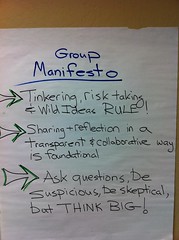"Taking care of those in need is valuable and honorable work, and most people do it with generosity and good intentions. But it also serves to mask the inequitable distribution of jobs, food, housing, and other valuable resources. When temporary shelter becomes a substitute for permanent housing, emergency food a substitute for a decent job, tutoring a substitute for adequate public schools, and free clinics a substitute for universal health care, we have shifted our attention from the redistribution of wealth to the temporary provision of social services to keep people alive."from "Social Service or Social Change?" by Paul Kivel
in The Revolution Will Not Be Funded: Beyond the Non-Profit Industrial Complex
edited by INCITE! WOMEN OF COLOR AGAINST VIOLENCE
"Solidarity is not charity. It is the mutual support between two peoples struggling for the same objectives." from Non-Intervention in Chile, 1970s
During our final SEED II meeting, we pondered the following excerpt from Flaurie's Solidarity vs. Charity workshop at the 2009 White Privilege Conference in Memphis.
1. Most people who engage in community service care about others and want to help those who need help.
2. There are positive, authentic, valuable community organizations out there that respond to people's needs.
3. The language around much of this work reflects biases of race, class, gender and other forms of privilege and oppression.
4. Most charitable organizations seek to alleviate most obvious manifestations of poverty but do not question root causes of poverty.
5. Many non-profit organizations in the community service sector have no activist base and are not accountable to any social justice movement. A volunteer corp is not the same as an activist base.
6. In schools, service-learning projects are often held up as the model for community service work, but we need to look critically both at the word "service" as well as what is being learned.
7. Organizations that take American abroad to do work generally do not spring from local, organic struggles, but rather from perceived needs on the part of U.S. citizens. As such, they are often not tied to any liberation movements in the host countries, and have no interest in addressing root causes or real liberation.
Q: What thoughts are running through your mind? How do the above pieces compare with your own thinking? What are your worst fears and best hopes as we move forward in this work?




2 comments:
My best hope is that this does not become an either/or discussion, but rather a serious look at all of the possible activities we can engage in and the value of each for itself, not necessarily as against some other form of positive, active engagement with the world around us.
I'm a little concerned about rewarding individuals for community service engagement. The best rewards that anyone will ever experience for this type of work are intrinsic. Applying external awards, to me, neither feels comfortable nor right.
Post a Comment